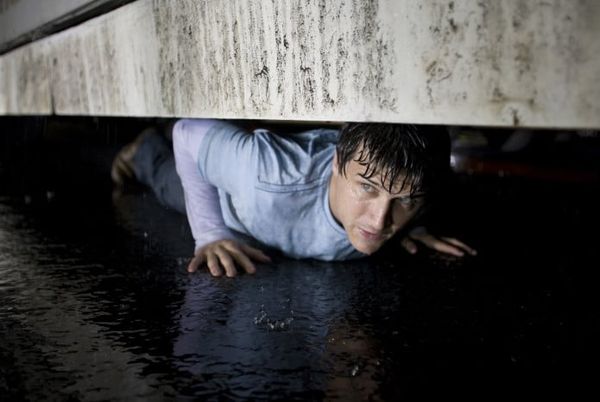Eye For Film >> Movies >> Hush (2008) Film Review
Hush
Reviewed by: Anton Bitel

"Well, what are we gonna do?"
As Zakes Abbott (Will Ash) and Beth Pryor (Christine Bottomley) speed late into the night along the M1, they may seem to be in motion, but in fact they are going nowhere. Zakes is stuck in cycle of irresponsibility, spending his time putting up posters in service station toilets when he should be working on his novel, and unable to follow through on his promise to move in with his long-term girlfriend. Beth, meanwhile, is waiting for the right time to tell him that she has met someone else and is thinking of moving on. If only Zakes would show some spine and do something decisive to end this emotional impasse.

With Beth dozing beside him, Zakes sees a truck pull in front of their car, and catches a fleeting glimpse in the truck's rear of a naked, screaming woman in a cage. Zakes calls the police, but against Beth's protests, does not want to take any further action. After the couple bickers painfully at Zakes' last roadside workstop for the night, Beth vanishes – and so a paranoid game of vehicular cat-and-mouse begins with the driver of the truck (Andreas Wisniewski), in which our hitherto idling hero will learn just how far he is willing to go, and how much he is willing to do, to save his beloved from a freight worse than death.
"I tried to get a film off the ground for ages," writer/director Mark Tonderai told the audience at the Film4 FrightFest All-Nighter on 1st November, 2008 where Hush premiered, "but as soon as I put a naked woman in the back of a truck..." - at this point he grins and clicks his fingers. Still, the actor and radio presenter's feature debut is no 'torture porn' sellout, but rather a taut thriller, rooted more in atmosphere, character and nail-gnawing suspense than the sort of sadistic gory excess that has otherwise typified this decade's horror. Sure, Zakes' transformation from zero to hero involves him facing some punishing brutality (he is even, in one sequence, born again after suffering a variant on crucifixion), but the emphasis here is always on high tension rather than low exploitation, so that the blood, when it comes, is all the more shocking for flowing so infrequently.
The chief reference points for Hush's motorway mayhem are Duel (1971), Roadgames (1981), The Hitcher (1986), The Vanishing (1988), Octane (2003) and Wolf Creek (2005), but Tonderai is also looking back further to Hitchcock. As an ordinary, not entirely likeable protagonist thrown into an extraordinary set of circumstances, Zacks is a typical Hitchcockian hero – and the master of suspense is also recalled in Tonderai's sure grip on his film's economy. Here even the most throwaway objects in the background (from a chocolate bar to a crane-suspended industrial container) are subsequently revealed to have real significance for the movement of the plot, as the increasingly resourceful Zacks uses anything and everything to hand in his battle with his faceless foe.
Perhaps, though, the finest indicator of Tonderai's qualities as a director (if not as a writer) is, paradoxically, his film's preposterousness – a preposterousness that, thanks to the deft handling of pace and tension, you will not have time to notice until Hush is well and truly over and you can once again catch your breath. It's a ride, all right – but when the road is this dark, and the traffic this fast, you'd be mad not to climb into the passenger seat. After all, what else are you gonna do?
Reviewed on: 10 Mar 2009

















